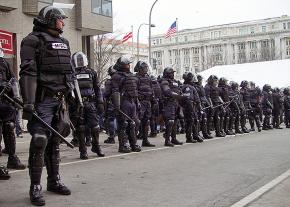Facing 10 years in prison for protesting
reports on the harsh crackdown against protesters in Washington, D.C.
IN AN ominous sign of the Trump administration's intention to crack down on the right to protest, federal prosecutors plan to charge 230 activists arrested on Inauguration Day with felony riot charges, punishable by up to 10 years in prison and a fine of up to $250,000.
Most of the arrests occurred in a four-block area in downtown Washington, with police indiscriminately kettling and detaining everyone on the street, including bystanders, journalists, legal observers and medics. The activists were suspected of breaking the windows of a bank, a Starbucks and a police car, and setting a limousine on fire.
"These charges are absolutely horrifying," Samantha Miller, an organizer with the Disrupt J20 Collective, told AlterNet's Sarah Lazare. "They are just trying to stop any resistance to the Trump administration. Many of these demonstrators were showing rage and fear of what's coming. It's going to take a lot more than asking nicely to create change and stop the threats from the Trump administration."

Jeffrey Light, an attorney based in Washington, D.C., who has represented protesters whose rights have been violated for more than a decade, said he's never seen felony riot charges filed against demonstrators.
Light has filed a class-action civil lawsuit alleging that police arrested everybody in the absence of individualized suspicion, which is a violation of basic civil liberties. The suit asks the court to expunge the arrest records of the activists and recognize that their rights were violated, and it calls for monetary damages as determined by a jury.
"There were a number of weapons we haven't seen Washington, D.C., police use in recent memory--flash-bang grenades and tear gas," Light told Lazare. "In addition to chemical irritants, they were assaulting people with batons. They were beating people."
While Light says this is the first time he recalls felony right charges being used against protesters, D.C. police have used the tactic of mass arrest before. In 2002, for example, police arrested nearly 400 people at a protest against the World Bank. Demonstrators were hogtied and held for hours before being released, with all charges dropped.
After years of legal battles, the World Bank protesters were awarded more than $10 million in damages from city and federal authorities. Peter Newsham, the acting D.C. police chief who oversaw the crackdown on protesters on Inauguration Day, was the assistant police chief who ordered the 2002 mass arrests, according to Lazare.
The Trump administration may hope to make such harsh treatment of demonstrations and protests the "new normal." It will be up to activists, civil liberties advocacy groups, civil rights attorneys and other social justice organizations to mount broad defense campaigns to respond to these blatant attacks on the right to dissent.
It should go without saying that such rights are more important than ever.


